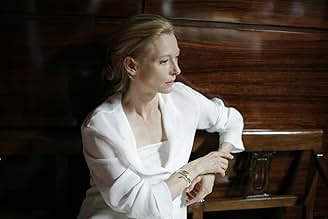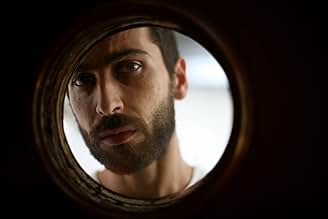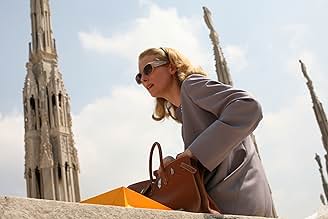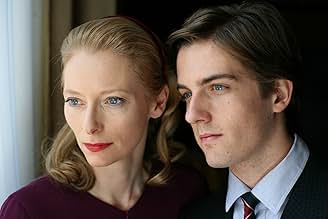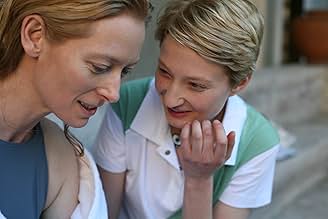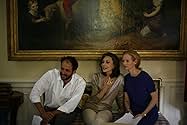Emma verließ Russland, um mit ihrem Mann in Italien zu leben. Als Mitglied einer mächtigen Industriefamilie ist sie die angesehene Mutter von drei Kindern, fühlt sich aber unerfüllt. Eines T... Alles lesenEmma verließ Russland, um mit ihrem Mann in Italien zu leben. Als Mitglied einer mächtigen Industriefamilie ist sie die angesehene Mutter von drei Kindern, fühlt sich aber unerfüllt. Eines Tages bringt Antonio, eine talentierte Köchin und Freundin ihres Sohnes, ihre Sinne zum Leu... Alles lesenEmma verließ Russland, um mit ihrem Mann in Italien zu leben. Als Mitglied einer mächtigen Industriefamilie ist sie die angesehene Mutter von drei Kindern, fühlt sich aber unerfüllt. Eines Tages bringt Antonio, eine talentierte Köchin und Freundin ihres Sohnes, ihre Sinne zum Leuchten.
- Für 1 Oscar nominiert
- 16 Gewinne & 47 Nominierungen insgesamt
Empfohlene Bewertungen
The focus is the fictional Recchi clan in Milan, and Emma (Swinton) is a Russian woman who married into the family and pretty much turned her back on her Slavic identity. Her husband Tancredi (Pippo Delbono) is the son of industrialist Edoardo (Gabrielle Ferzetti), for whom a party is thrown where he announces that he is handing the business to his son.
By this point, it starts to become apparent that Emma's life feels incomplete. Maybe it's the weirdness of a life where one is always surrounded by extended family and getting waited on hand and foot - and how the extended family seems determined to organize all relationships - or maybe it's the surprise at learning of her daughter Elisabetta's (Alba Rohrwacher) lesbianism. But when Emma's son Edoardo Jr. (Flavio Parenti) introduces her to chef Antonio (Edoardo Gabriellini), who prepared the cake, this begins a new chapter in Emma's life.
Throughout the movie, it seemed that the food acted as a metaphor: Emma was starting to taste a whole side of her existence about which she'd never known. Maybe the food and other visuals were a little overstated throughout the movie, but I think that the end result was a good one. To be certain, there was a scene in the movie that made me feel as though I'd just stopped breathing - you'll know it when you see it - and I think that what Emma does at the end is the only thing that she could have done. I recommend the movie.
PS: Marisa Berenson, who plays Allegra, previously starred in "Death in Venice" and "Cabaret". She is the sister of actress Berry Berenson, who married "Psycho" star Anthony Perkins and was in one of the planes that crashed into the World Trade Center on September 11, 2001.
Written by Barbara Alberti, Ivan Cotroneo, Walter Fasano and Guadagnino and based on a story by the director, the film begins in snowy Milan in the winter. The very wealthy Recchi family, owners of a textile factory that it is hinted supported Musolini and the Fascists during the war, is having a dinner party in their aristocratic house catered by a host of servants wearing white gloves. The elderly grandfather and patriarch of the family Edoardo Sr. (Gabrielle Ferzetti) is about to retire, evoking the Visconti film, The Leopard. Shockwaves roll throughout the gathering, however, when he names both his son Tancredi (Pippo Delbono) and his handsome grandson Edo (Flavio Parenti) as joint controllers of the business. Befitting the family's pride, when Edo tells the group that he has come in second in a race, the elderly patriarch says "The Recchis never lose." The Russian born Emma (Tilda Swinton) is Tancredi's wife and mother of three grown children, sons Edo and Gianluca (Mattia Zacarro), and artist and photographer daughter Betta (Alba Rohrwacher). Though on the surface she is a loyal and supporting wife and mother and has made a complete adjustment to the Italian bourgeois way of life, underneath there is a growing boredom and discontent as sensed by her servant Ida (Maria Paiato). We get a hint of this stirring when daughter Betta reveals to her that she is a Lesbian and is in love with a fellow classmate in England. The longing for adventure crystallizes further when she meets Edo's friend Antonio (Edoardo Gabbriellini) who is a master chef who is planning to open a restaurant with Edo.
Joining her mother-in-law Allegra (Marisa Berenson) and Edo's girl friend Eva (Diane Fleri) for lunch, Emma's senses are fully awakened while eating prawns prepared by Antonio. Passing through San Remo on a trip to Nice to attend an exhibition to which she has been invited by daughter Betta, Emma unexpectedly bumps into Antonio who eagerly invites her to view the restaurant site. Despite the fact that Antonio is probably 10 to 15 years younger than her, this chance encounter leads to a bursting forth of Emma's tightly controlled sexual inhibitions and a swirl of passionate lovemaking in the rustic countryside, their engaged body parts mirrored by close-up shots of flowers and insects in a very poetic but overly aestheticized manner.
Reminiscent of Ibsen's 1879 play The Doll's House, the main thrust of the film is the repression of an upper class woman who suddenly discovers that there should be more zest to her life, presumably triggered by her daughter's openness in discussing her sexual preference. The love affair, however, triggers many changes in the Recchi family, both economically and psychologically. Tancredi is forced to sell their business to an Indian investor who explains that "capitalism is democracy". The scenes in London with the financiers are very strong but are treated as a minor sub-plot with the emphasis quickly given over to the family's psychological distress.
When Edo puts two and two together and realizes his mother's sexual adventures with his best friend, the result is tragedy for the entire family, a series of events handled by the director in an involving but melodramatic fashion. Though Emma has been praised by some for the courage she shows in breaking away from a static marriage, one wonders if a greater courage would perhaps have been shown if she had gotten in touch with the love she once had for her husband, fulfilled her solemn oath, "till death do us part", and resumed her responsibilities as a caring mother. While I was moved by much of the visual beauty of the film and the idea of breaking with tradition and listening to the voices within, I was infrequently emotionally involved with the characters and I Am Love felt distant and often contrived.
Really. I was amazed. You see, I'm such a sucker for emotional engagement with characters – I'll laugh, cry, hate, fear, cheer and philosophise along with pretty much any film I watch. I'm a producers dream.
But this? It washes over you and you sit (admiring the view) in the hope and expectation that something is going to happen soon. Something will surprise you. A character will suddenly come to life – reach out and draw you in. That you'll get a golden moment, or even a whiff of cinematic soul. But no. Nothing.
So – there it is. There's either something vital that I'm missing here or this emperor is indeed stark naked? I Am Disappointed.
As a young, working class Russian, Emma (Tilda Swinton) is whisked away to marriage and life in the aristocracy of Milan. She dutifully raises her kids and organizes huge dinners and parties at their mansion as the Rechhi's entertain business clients and their own family. It is during these parties that we realize Emma is technically part of the family, but really is still an outsider. She escapes to her own space once the events are running smoothly.
Being an avid cook herself, she easily clicks with a brilliant young chef introduced to the family by her own son. Very little doubt where it's headed at this point as Emma unleashes the pent up energy she has been forced to hide. While we are very aware that the upper crust has learned to look the other way with infidelity, that's not the case with the Rechhi's and their Russian wife/mother.
The brilliance in the film is that it shows how the younger generation doesn't really fit any better than Emma. The difference is that they are part of the fabric and will be allowed more rope than an outsider. Still it is painful to watch Emma and her son, who can't quite adapt to the family business. Better yet, to watch her with her daughter, who confesses her preference for other women. Emma sees herself in these two, but doesn't have the same freedom. Her best ally is the caretaker who seems to understand the multiple levels on which this family functions.
Fascinating interactions and complex writing make this a film for film lovers. There is so little dialogue, but so much is said with a glance or head nod. Many U.S. writers could learn a thing or two. Must also mention the startling score by John Adams. It is quite operatic, which plays along with the themes of the film.
Director's Trademarks: The Films of Luca Guadagnino
Director's Trademarks: The Films of Luca Guadagnino
Wusstest du schon
- WissenswertesLead actress Tilda Swinton learned both Italian and Russian for the part, neither of which she spoke before filming.
- PatzerWhen Edoardo and Elisabetta meet in London, there's a lot of shadow on the pavement. When they walk away together in the next shot, there's a lot more sun. But the weather can change quickly in the UK.
- Zitate
Elisabetta Recchi: Happy is a word that makes one sad.
- VerbindungenFeatured in At the Movies: Venice Film Festival 2009 (2009)
Top-Auswahl
- How long is I Am Love?Powered by Alexa
Details
- Erscheinungsdatum
- Herkunftsland
- Offizielle Standorte
- Sprachen
- Auch bekannt als
- Yo soy el amor
- Drehorte
- Villa Necchi Campiglio, Milan, Lombardia, Italien(Recchis' villa)
- Produktionsfirmen
- Weitere beteiligte Unternehmen bei IMDbPro anzeigen
Box Office
- Budget
- 3.600.000 € (geschätzt)
- Bruttoertrag in den USA und Kanada
- 5.005.465 $
- Eröffnungswochenende in den USA und in Kanada
- 121.504 $
- 20. Juni 2010
- Weltweiter Bruttoertrag
- 12.747.768 $
- Laufzeit
- 2 Std.(120 min)
- Farbe
- Sound-Mix
- Seitenverhältnis
- 1.85 : 1




